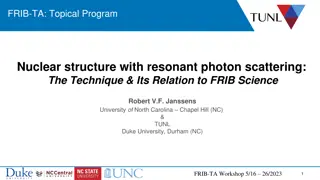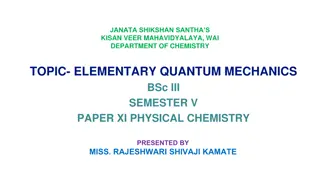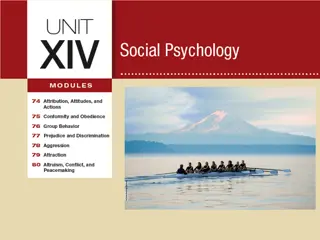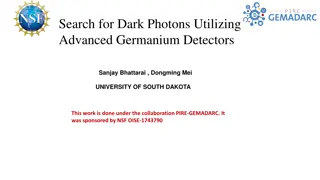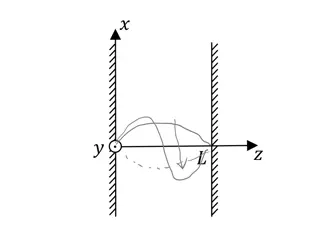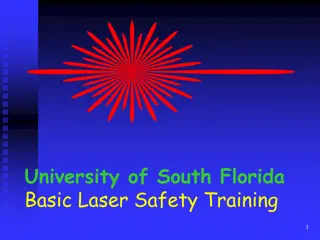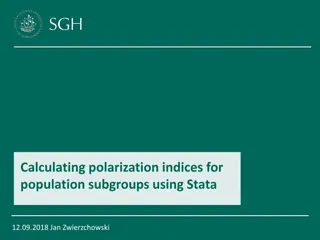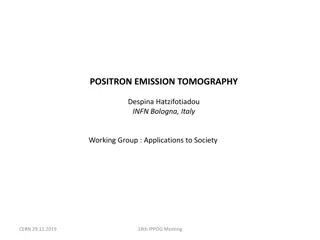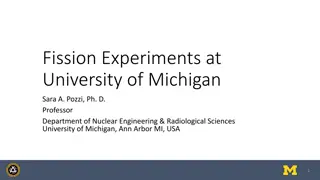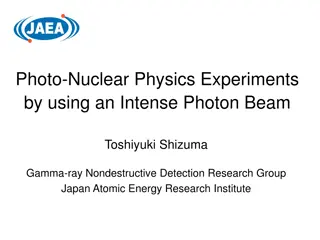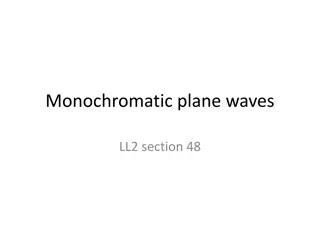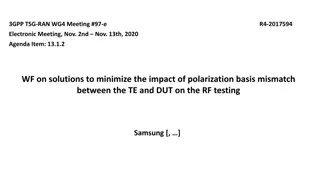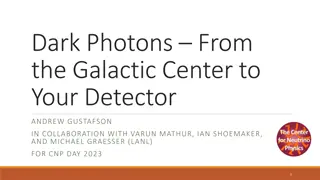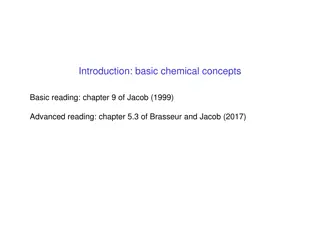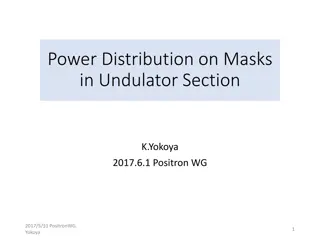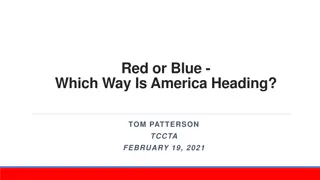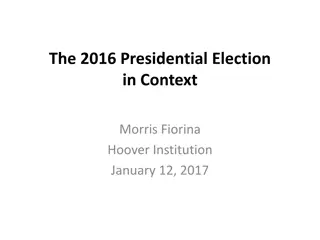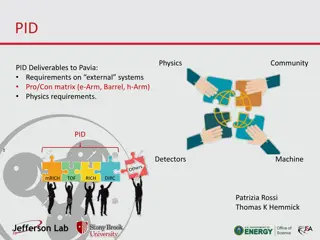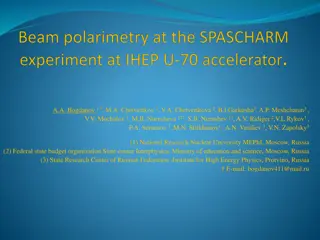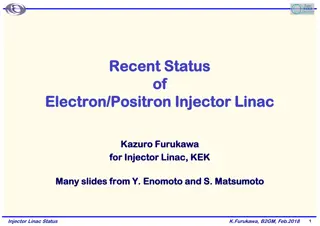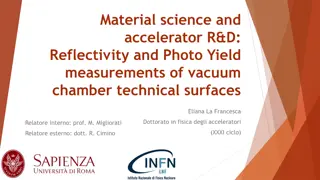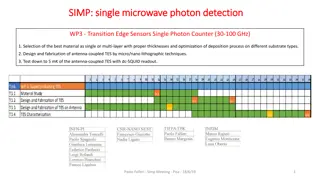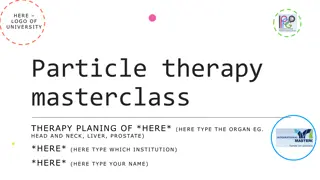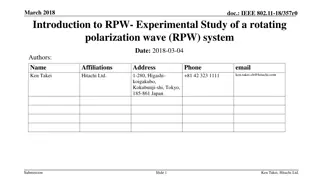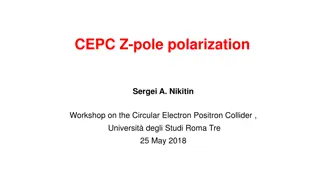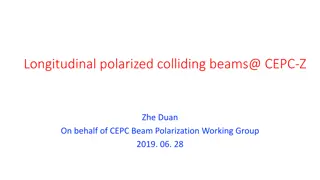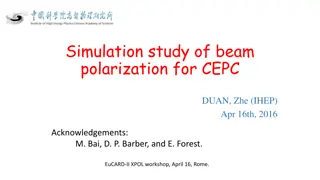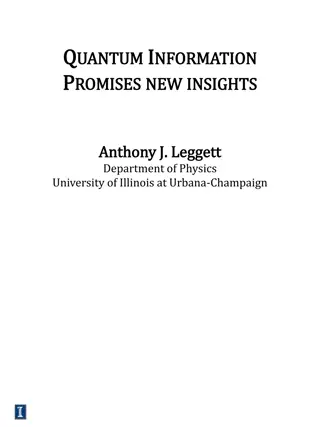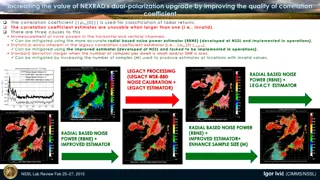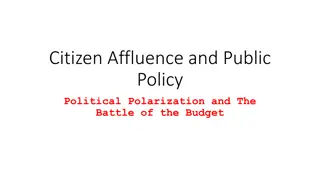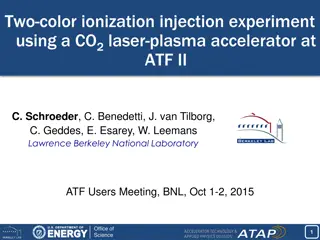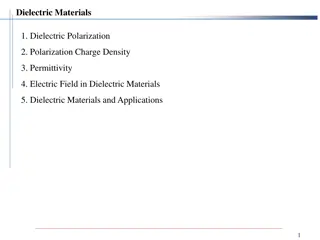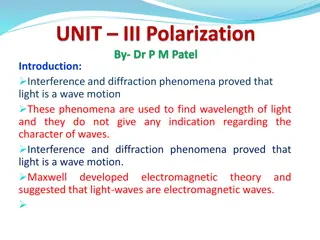Understanding Waves, Light, & Sound: Vocabulary and Concepts
This chapter covers essential vocabulary and concepts related to waves, light, and sound, including amplitude, crest, diffraction, Doppler effect, electromagnetic wave, frequency, interference, longitudinal wave, mechanical wave, medium, photon, pitch, reflection, refraction, sound wave, standing wa
8 views • 21 slides
Innovations in Pixel Detector Technology for Photon Science
Technologies and advancements in pixel detector development for photon science applications are showcased in this content. Topics discussed include balancing gain and dynamic range in hybrid pixel detectors, performance assessments of integrating pixel detectors, and strategies for photon detection
4 views • 21 slides
Physics Problem-Solving: Kinematics, Dynamics, and Laser Energy
Explore various physics problems involving linear kinematics, 2-dimensional motion, dynamics, laser energy, and more. Learn how to calculate velocities, distances, forces, energies, and photon properties in different scenarios.
5 views • 22 slides
Nuclear Structure Investigations with Resonant Photon Scattering at FRIB-TA Workshop
Explore nuclear structure using resonant photon scattering at the FRIB-TA Workshop. The High Intensity Gamma-ray Source facility enables research on photonuclear reactions, spin and parity determinations, and selective investigation of nuclear states. Learn about the technique's potential impact on
2 views • 33 slides
Heisenberg's Uncertainty Principle in Elementary Quantum Mechanics
Heisenberg's Uncertainty Principle, proposed by German scientist Werner Heisenberg in 1927, states the impossibility of simultaneously and accurately determining the position and momentum of microscopic particles like electrons. This principle challenges classical concepts of definite position and m
0 views • 49 slides
Understanding Group Behavior: Influence and Dynamics
Explore the impact of social facilitation, social loafing, and deindividuation in shaping individual actions within groups. Understand how group interaction can lead to phenomena like group polarization and groupthink. Dive into the role of the Internet in exacerbating group polarization and how cul
4 views • 35 slides
Search for Dark Photons Utilizing Advanced Germanium Detectors at University of South Dakota
Research at the University of South Dakota under the collaboration PIRE-GEMADARC focuses on developing advanced germanium detectors with low energy thresholds for detecting low mass dark photons. The study aims to optimize event detection using new Ge detectors with internal charge amplification. Th
0 views • 16 slides
Understanding Quantum Aspects of Electromagnetic Oscillations
Exploring the quantum nature of electromagnetic oscillations through concepts such as wave-particle duality, quantum harmonic oscillators, photon-number states, coherent light, and squeezed light. Delve into non-classical states, vacuum states, potential wells, and more in the fascinating world of q
1 views • 15 slides
Understanding Laser Fundamentals and Components
Laser technology operates on the principles of monochromatic, coherent, and directional light emission, making it distinct from ordinary light sources. This training covers the fundamental aspects of laser operation, contrasting it with incandescent light, and delves into the common components found
0 views • 31 slides
Understanding Economic Polarization and Polarization Indices
Explanation of the concept of economic polarization and the calculation of polarization indices for population subgroups using Stata. Discusses the disappearance of the middle income class, misuse of the term economic polarization, and measures like the median relative polarization index (MRP) for a
2 views • 15 slides
Positron Emission Tomography: Applications in Society and Recent Developments
Positron Emission Tomography (PET) is a medical imaging technique focusing on metabolic differences in the body. By using positron-emitting radioisotopes, PET can detect how molecules are taken up by healthy and cancerous cells, aiding in accurate tumor localization with lower doses. The evolution o
0 views • 6 slides
Advanced Fission Experiments at University of Michigan
The University of Michigan, under the guidance of Dr. Sara A. Pozzi, conducts cutting-edge fission experiments leveraging organic scintillation detectors. These detectors offer advantages such as nanosecond-scale response times, energy proportionality, and scalability. The experiments focus on impro
0 views • 4 slides
Advanced Photon-Beam Experiments in Nuclear Physics Research
Explore cutting-edge experiments in nuclear physics using intense photon beams, nondestructive isotope detection, laser Compton scattering rays, and photon beams for fundamental collective motion studies. Learn about nuclear resonance fluorescence, dipole excitation strength distribution, and detail
0 views • 12 slides
Understanding Monochromatic Plane Waves in Electromagnetic Theory
Explore the characteristics and properties of monochromatic plane waves in electromagnetic theory, including their spatial distribution, propagation in the positive X direction, wavelength, linear and non-linear operations, polarization direction, elliptical and circular polarization, and the relati
0 views • 15 slides
Combined Effect of Charged Particles Irradiation and Anticancer Drugs in Cultured Human Tumor Cells
Research collaboration aimed to enhance locoregional tumor control and reduce distant failure by combining charged particles irradiation and anticancer drug Epothilone B in cultured human tumor cells from Milano and Roma. The study explores the impact on clonogenic survival, growth curves, and deter
0 views • 13 slides
Solutions to Minimize Polarization Basis Mismatch Impact in RF Testing
The agenda item discusses proposals to reduce the impact of polarization basis mismatch between the test equipment and device under test during RF testing in the 3GPP TSG-RAN-WG4 meeting. Various methods, such as the TPMI side condition method and DL polarization scan method, are being considered to
0 views • 10 slides
Understanding Biased Assimilation and Attitude Polarization in Social Disputes
People with strong opinions on complex social issues tend to interpret evidence in a biased manner, accepting confirming evidence readily while subjecting disconfirming evidence to critical evaluation. This can lead to increased polarization rather than narrowing of disagreement when exposed to the
0 views • 20 slides
Unveiling Dark Matter Mysteries Through Dark Photons
Delve into the exploration of dark matter through the lens of dark photons in the galactic center and detectors. Uncover the enigmatic nature of dark matter, its interactions, existing constraints, and our model with fermionic dark matter and a dark photon mediator. Discover strategies to evade cons
0 views • 18 slides
Understanding Chemical Reaction Kinetics: From Unimolecular to Three-Body Reactions
Explore the fundamental concepts of chemical reactions, including unimolecular reactions like thermolysis and photolysis, bimolecular reactions, and three-body reactions. Learn about rate constants, reaction mechanisms, and the impact of pressure on reaction rates. Discover how energy transfer, phot
0 views • 9 slides
Power Distribution Analysis in Undulator Section
The study focuses on analyzing the power distribution on masks in an undulator section to determine if the mask design is adequate. Key parameters such as power deposition at the masks, on the inner surface of the undulators, and the need for a collimator in front of the target are examined. Assumpt
0 views • 11 slides
The Divided States of America: A Look at Party Polarization
The images depict the growing party polarization in American politics, showing the widening gap between Republicans and Democrats since the 1980s. The data visualizations illustrate how the ideological divide has evolved over the years, culminating in high levels of animosity and competition between
0 views • 48 slides
Trends in U.S. Political Landscape: Polarization and Party Dynamics
The analysis delves into the evolution of the U.S. political scene, highlighting shifts in party majorities, polarization among liberals and conservatives, maintenance of moderate factions, the significance of independents, and the dominance of centrist issues. It explores the challenges posed by th
0 views • 37 slides
PID Physics Community Deliverables to Pavia: Requirements and Developments
Requirements and developments of external systems and detectors (e-Arm, Barrel, h-Arm) for PID Physics Community to Pavia are detailed. The deliverables include Pro/Con matrices, physics requirements, and advancements in detectors such as mRICH, TOF, RICH, and DIRC. Various simulation results, advan
0 views • 13 slides
Simulation and Reconstruction on BEPCII Polarization Measurement
Simulation and reconstruction process for BEPCII polarization measurement involve generating events, recording back-scattered photons in phase space, analyzing polarization on glass plates and Si sensors, and fitting results to optimize data accuracy.
0 views • 17 slides
Measuring Proton and Antiproton Polarization at U70 Accelerator
Absolute polarimeters are described for the beam channel at U70 Accelerator in Russia, focusing on transporting polarized proton and antiproton beams. Various polarimeters are discussed for measuring proton and antiproton polarization, including diffraction and interference-based techniques. The exp
0 views • 37 slides
Overview of Electron/Positron Injector Linac Upgrades at KEK
The recent status of the Electron/Positron Injector Linac at KEK, presented by Kazuro Furukawa, highlights the mission to achieve 40 times higher luminosity in the SuperKEKB collider. The upgrades include low emittance, low energy spread injection beams with higher beam current, new high-current pho
0 views • 23 slides
Reflectivity and Photo-Yield Measurements for Vacuum Chamber Surfaces
Eliana La Francesca's doctoral research in accelerator physics focused on studying the impact of synchrotron radiation on vacuum chamber surfaces. By analyzing reflectivity and photo-yield measurements, the study explored detrimental effects such as photon-stimulated desorption, heat load on acceler
0 views • 32 slides
Research Project on Microwave Photon Detection with Transition Edge Sensors
Investigation and fabrication of TES materials for single photon detection in the microwave range, optimizing material selection, deposition processes, and antenna-coupled TES design. Tasks include materials characterization, antenna simulations, and TES microwave characterization. The project aims
0 views • 9 slides
Comparison of Photon, Proton, and Carbon Ion Therapy for Liver Cancer
This document elaborates on the comparison of photon, proton, and carbon ion therapy for liver cancer. It includes abstract, phantom CT scan analysis, organ delineation, photon vs. proton therapy comparisons, and proton vs. carbon ion therapy comparisons with corresponding images. Detailed discussio
0 views • 11 slides
Experimental Study of Rotating Polarization Wave (RPW) System in Wireless Communication
A wireless system controlling polarization for improved communication quality was tested successfully in various environments, enhancing quality especially in cluttered spaces without line-of-sight paths. By manipulating polarization, data transfer reliability and effectiveness were enhanced, overco
0 views • 14 slides
Radiative Polarization Techniques in CEPC for Precision Measurements of Z-Pole Mass
Prof. Jie Gao led discussions on the CEPC polarization program, focusing on obtaining transverse and longitudinal polarizations. The use of special wigglers to enhance the polarizing effect of the magnetic field was highlighted, reducing the time needed for radiative self-polarization. Strategies to
0 views • 22 slides
Achieving High Average Beam Polarization in Particle Colliders
Detailed discussion on achieving high average beam polarization in particle colliders like CEPC, focusing on longitudinal polarized colliding beams, beam polarization requirements, basic formulas, and strategies for maintaining beam polarization during physics runs. Emphasis on scenarios involving s
1 views • 16 slides
Beam Polarization Simulation Study for CEPC
Simulation study on beam polarization for the Circular Electron Positron Collider (CEPC) using the PTC Poly- morphic Tracking Code. The study includes orbital and spin tracking, equilibrium polarization calculation, and Monte-Carlo simulation of depolarization rate. Comparison with other Monte-Carlo
1 views • 20 slides
Exploring Quantum Information through Polarization of Photons
Quantum information and photon polarization are explored in this detailed presentation featuring the ultimate quantum 2-state system. The content delves into the behavior of single photons at a quantum level, showcasing the intriguing properties and implications of quantum superposition in polarizat
1 views • 14 slides
Enhancing NEXRAD's Dual-Polarization Upgrade for Improved Correlation Coefficients
Enhance the value of NEXRAD's dual-polarization upgrade by improving the quality of correlation coefficients, particularly focusing on the usability and accuracy of | ρ hv (0)| for radar return classification. Addressing issues with correlation coefficient estimates exceeding one is crucial for val
0 views • 6 slides
Political Polarization and Public Policy Recommendations
This content discusses the relation between citizen affluence, public policy, political polarization, and budget battles. It includes images related to these topics and proposes strategies such as re-regulating Wall Street, taxing the rich, implementing universal preschool, imposing price controls o
0 views • 9 slides
Solutions to Minimize Polarization Basis Mismatch Impact in RF Testing
In the 3GPP TSG-RAN-WG4 Meeting #97-e, discussions focused on minimizing the impact of polarization basis mismatch between the TE and DUT in RF testing for Samsung devices. Various proposals were presented relating to EIRP measurement and methods to enhance testing procedures. Key topics included TP
0 views • 10 slides
Two-Color Ionization Injection Experiment Using CO2 Laser-Plasma Accelerator
This experiment conducted at ATF II focused on generating beams with ultra-low transverse emittance utilizing two-color ionization injection with a CO2 laser-plasma accelerator. The technique involves using a pump laser pulse in circular polarization and an injection laser pulse in linear polarizati
0 views • 15 slides
Understanding Dielectric Materials: Polarization Mechanisms and Applications
Learn about dielectric polarization, charge density, permittivity, and the electric field in dielectric materials. Explore different types of polarization mechanisms such as electronic, molecular, and ionic polarization, as well as how polarization charge densities are modeled. Discover the signific
0 views • 27 slides
Understanding Light Wave Polarization and Brewster's Law
Interference and diffraction phenomena demonstrate light as wave motion, leading to insights on wave nature. Maxwell's electromagnetic theory supports light as transverse waves. Learn about polarization of light waves, production methods, and applications in industry. Explore the discovery of light
0 views • 89 slides


